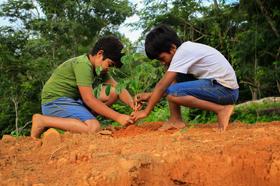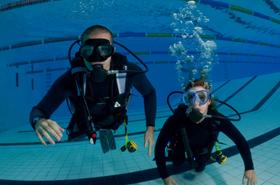Could being married help you earn better grades in college? Interestingly, studies have found that students who are married generally report higher grades and grade point averages.
According to the Research in Higher Education Journal, a study of college students “confirms earlier work regarding the positive influence of marriage on the scholastic achievement of community college students.” The study also found that married students tended to excel most significantly in programs such as Business Administration, Executive Secretarial, and Nursing Education.
While the causation relationship between marriage and good grades still remains unclear, community colleges are not wasting any time in helping their students benefit from the positive correlation! Many college campuses offer marital workshops and classes that help improve relationships, while other courses delve into the sociological underpinnings of marriage in our society.
Community Colleges Workshops that Foster Stronger Marriages
Through workshops and lectures, many community colleges specifically cater to students who are currently or planning to be married. For example, at Arapahoe Community College in Littleton, Colorado, couples can take a variety of non-credit workshops, such as “Before You Say ‘I do’ Marriage Education for Engaged Couples, "Four Hours to a Happier Relationship," "Is Anyone Listening to Me? Solving Communication Problems in Relationships,” and “Preparing for Your Empty Nest Marriage: Now That the Kids are Leaving.” Through these workshops, students learn about how to strengthen their relationships – and potentially even their grades in school!
On a broader basis, The National Healthy Marriage Resource Center (NHMR) is an excellent resource for finding workshops on relationships and marriage. Through NHMR's Programs and Initiatives tool, students can search for workshops held on community college campuses throughout their specific state. For example, in Wisconsin, through the Healthy Marriage Education / Milwaukee Marriage Partnership, over 120 community college students participate in their annual marriage workshops.
Learning about Marriage – and Earning College Credit
Adding to the non-curriculum resources available at community colleges, many campuses offer credit-based family and marriage as well. For example, students pursuing a degree in sociology or family services will likely need to complete courses that examine the history and current state of domestic unions. Such is the case for students enrolled at Raritan Valley Community College (RVCC), located in Branchburg, New Jersey.
At RVCC, students pursuing sociological courses of study may enroll in classes such as “Marriage and the Family.” Exploring topics such as love, relationships, gender roles, family violence, communication, conflicts, separation, and divorce, courses such as “Marriage and the Family” provide students with an opportunity to examine the exposition and evolution of marital bonds around the world, while additionally exploring “Insights into contemporary marital and family concerns while providing both a historical and cross-cultural analysis of family systems.”
The “Marriage and Family” course is one of the most popular sociological electives at RVCC, which demonstrates the relevancy of the course material on the students’ lives.
In addition to opportunities at Raritan Valley Community College, schools such as Pima Community College, located in Tucson, Arizona, offer additional marriage-based educational pathways. If pursuing a career in law or legal services, students can begin their studies with the “Law Essentials” class. While “Law Essentials” examines an array of social and legal topics, one of the primary subjects in the course revolves around marriage and family law. Exploring the legal definition of marriage, various types of legal marriages, processes of divorce or dissolution, students learn about widespread issues that are commonly reported among American couples.
While researchers are still exploring why married students earn better grades, community colleges have already jumped on the bandwagon to encourage healthier marriages amongst their students and cities. Through a workshop or credit-based course, community college students everywhere are learning how to strengthen their marriages and relationships.













